Lynn Nottage’s Pulitzer Prize-winning play, Ruined, explores survival and resilience in the Democratic Republic of Congo. Available as a PDF, it offers a haunting look at war’s impact on women.
Overview of the Play
Ruined, written by Lynn Nottage, is a powerful drama set in a brothel during the civil war in the Democratic Republic of Congo. The play explores themes of survival, gender, and resilience through the lives of women caught in the conflict. Mama Nadi, the brothel owner, becomes a central figure, navigating the complexities of war while protecting her business and the women under her care. The play is both haunting and thought-provoking, offering a raw look at the human cost of war. Available as a PDF, it remains a significant work in contemporary theater.
Historical Context of the Democratic Republic of Congo
The Democratic Republic of Congo (DRC) has endured decades of turmoil, including colonial exploitation under Belgium and prolonged civil war. The conflict involves various armed groups, displacing millions and causing widespread violence. Women, in particular, face brutal treatment, with sexual violence used as a weapon of war. This historical backdrop shapes the setting of Ruined, where characters navigate survival amidst chaos. The play reflects the resilience of women in the face of war and exploitation, offering a poignant lens into the DRC’s troubled history. The PDF version of the play provides deeper insight into these themes.
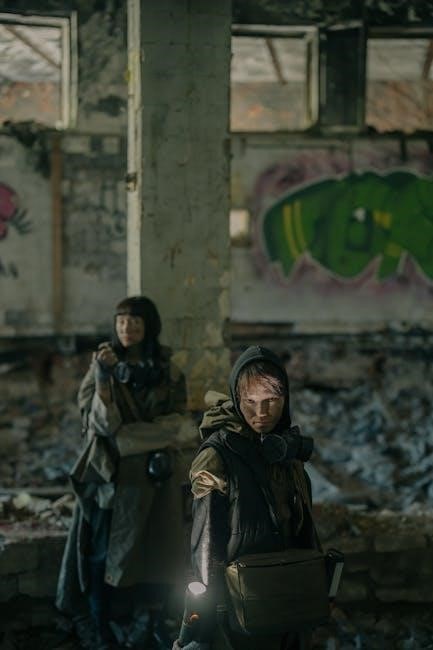
Plot Summary
Ruined by Lynn Nottage is set in a brothel run by Mama Nadi during the civil war in the Democratic Republic of Congo. The play explores the lives of women caught in the conflict, their survival strategies, and the emotional toll of war. Available as a PDF, the story delves into themes of resilience, exploitation, and hope amidst chaos. The narrative intertwines personal struggles with the broader societal impact of war, creating a powerful and haunting portrayal of life in a war-torn region.
Setting: Mama Nadi’s Brothel
The play is set in Mama Nadi’s brothel, located in the Democratic Republic of Congo during the civil war. The brothel serves as both a refuge and a place of exploitation, where women survive by catering to soldiers from opposing sides. Mama Nadi, the proprietor, maintains a fragile order, balancing business with the harsh realities of war. The setting reflects the duality of survival and exploitation, as the brothel becomes a microcosm of the broader conflict. The atmosphere is tense, with music and laughter masking the underlying trauma. This setting underscores the play’s themes of resilience and exploitation.
Key Characters and Their Roles
Mama Nadi, the brothel owner, is the central figure, embodying strength and pragmatism. She provides refuge but also exploits the women. Salima, a young woman, enters the brothel after being displaced and brutalized, her story highlighting personal resilience. Josephine, Mama Nadi’s assistant, contrasts with the others, her hardened exterior hiding vulnerability. These characters illustrate survival strategies, each navigating exploitation, trauma, and hope amidst war’s chaos. Their roles interweave to depict the broader impact of conflict on women in the DRC, creating a powerful narrative of survival and resilience; Their stories form the emotional core of the play.
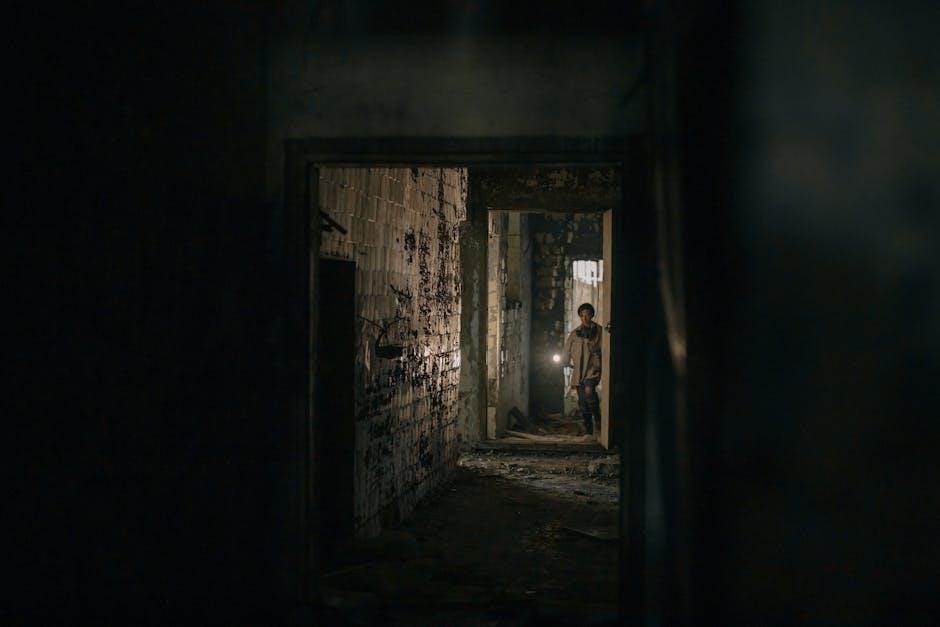
Themes and Symbolism
Ruined explores themes of survival, exploitation, and resilience, with Mama Nadi’s brothel symbolizing both refuge and oppression. The play examines gender roles and the commodification of women’s bodies, highlighting their strength in the face of war and societal breakdown. The brothel serves as a microcosm of the broader conflict, reflecting the moral and emotional toll of war on individuals and communities. Through its characters and setting, the play underscores the human cost of violence and the enduring struggle for dignity and survival. The themes resonate powerfully, offering a poignant commentary on humanity.
Exploration of Gender and Survival
Ruined delves into the intersections of gender and survival, portraying women navigating a war-torn Democratic Republic of Congo. The play highlights how females endure exploitation, violence, and marginalization, yet find resilience through solidarity and resourcefulness. Mama Nadi’s brothel becomes a complex space where survival is negotiated, blending vulnerability with strength. The characters’ journeys reveal the societal constraints imposed on women and their strategies to reclaim agency. Nottage critiques patriarchal structures while celebrating women’s resistance and survival, offering a powerful exploration of gender dynamics in conflict zones. The play underscores the human spirit’s ability to endure even amidst profound adversity.
The Impact of War on Women
Ruined vividly portrays the devastating effects of war on women in the Democratic Republic of Congo. The play highlights their physical and emotional scars, forced displacement, and exploitation. Women become commodities in the conflict, subjected to sexual violence and forced labor. Yet, amidst the chaos, they find ways to survive and resist. Nottage’s work sheds light on the resilience and strength of these women, offering a poignant critique of how war disproportionately affects them. The play serves as a testament to their enduring spirit and the human cost of conflict.
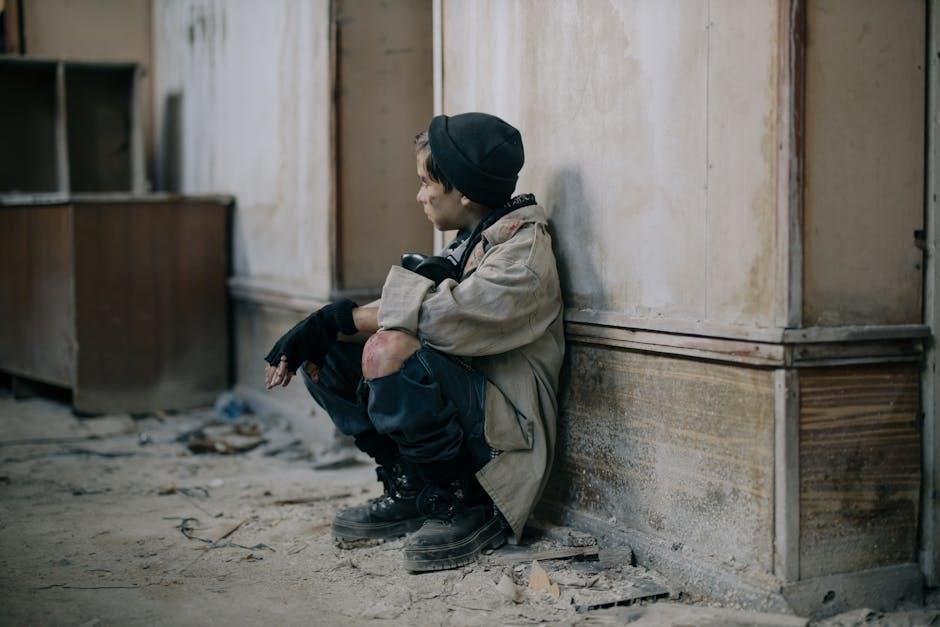
Awards and Recognition
Ruined earned Lynn Nottage the Pulitzer Prize for Drama, along with the Drama Desk Award and New York Drama Critics Circle Award for Best Play in 2009.
Pulitzer Prize for Drama
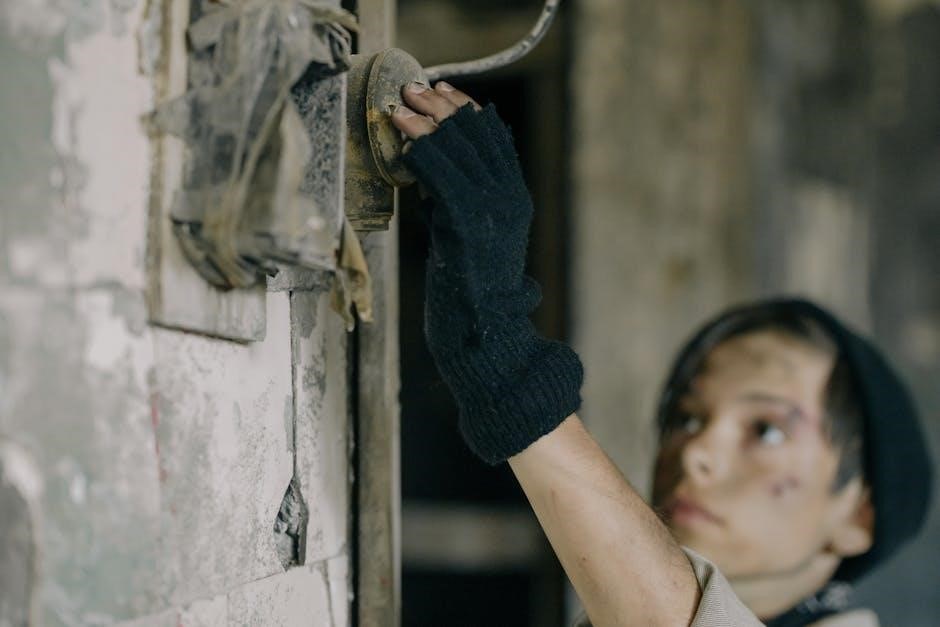
Lynn Nottage’s Ruined won the Pulitzer Prize for Drama in 2009, recognizing its profound exploration of women’s survival during the Congolese civil war. This prestigious award highlights the play’s vivid portrayal of resilience and its unflinching look at the human cost of conflict.
Other Notable Awards
Besides the Pulitzer Prize, Ruined earned the Drama Desk Award for Outstanding Play and the New York Drama Critics’ Circle Award for Best Play. These recognitions underscore its emotional depth and societal impact. The play’s unflinching portrayal of war’s effects on women resonated widely, cementing its place in contemporary theater. Its availability as a PDF has made it accessible for global audiences, further amplifying its influence and ensuring its themes remain relevant in modern discussions about conflict and gender.
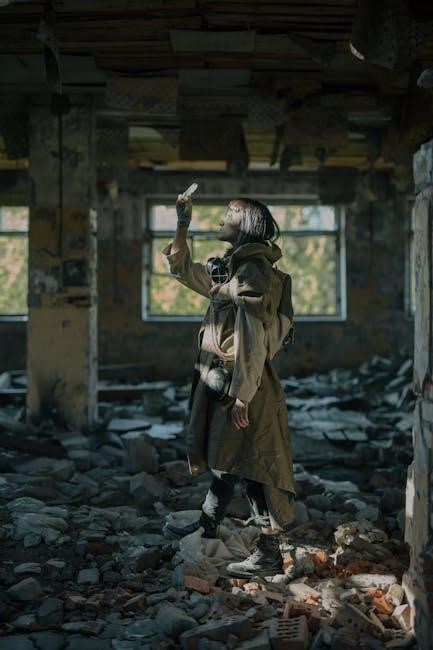
Performance History
Ruined premiered at the Goodman Theatre in Chicago before its European debut at London’s Almeida Theatre in 2010, running from April 15 to June 5, 2010. The play also had a notable production in November 2013, further solidifying its impact on global stages.
World Premiere and European Debut
Ruined premiered at the Goodman Theatre in Chicago, marking its world debut. Its European premiere followed at London’s Almeida Theatre, opening on April 22, 2010, after previews from April 15. The production ran through June 5, 2010. Directed by Kate Whoriskey, the play featured a talented cast, including Michele Matherson as Mama Nadi, with stage management by Kimberly Osgood. The European debut further solidified the play’s acclaim, drawing international attention to its powerful narrative and universal themes. Both productions underscored Ruined’s ability to resonate across cultures and continents.
Notable Productions and Cast
The Goodman Theatre in Chicago hosted the world premiere of Ruined, directed by Kate Whoriskey, featuring a standout performance by Michele Matherson as Mama Nadi. The European debut at London’s Almeida Theatre also garnered acclaim, with a talented cast bringing the story to life. Key actors included Lucian Msamati, Jenny Jules, and Letitia Wright, who portrayed the complex characters with depth and nuance. These productions were praised for their authenticity and emotional impact, further cementing the play’s reputation as a powerful exploration of resilience and survival during wartime. The cast’s performances were integral to the play’s success and critical acclaim.
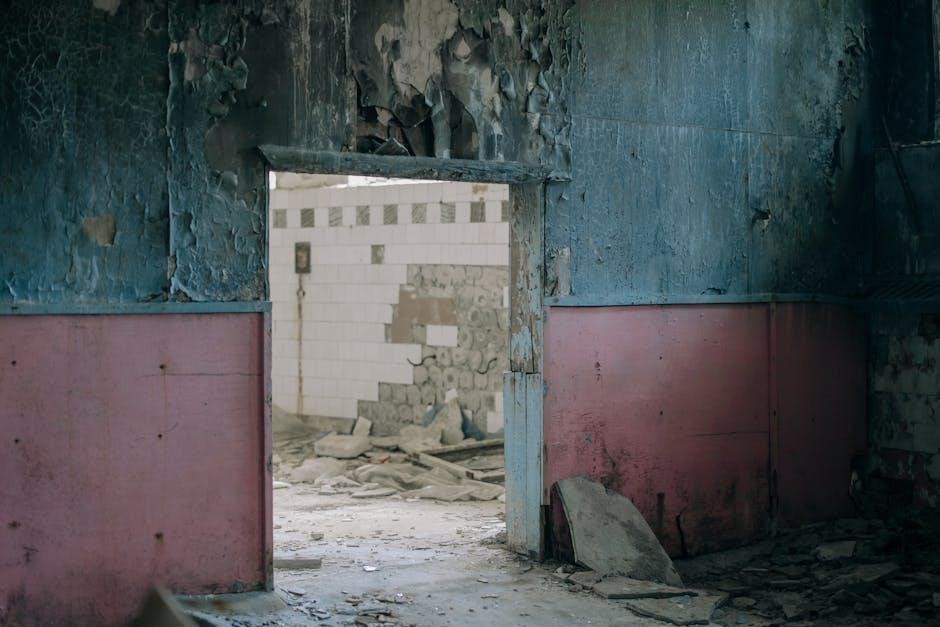
Critical Reception
Ruined received widespread critical acclaim for its unflinching portrayal of war’s impact on women. Critics praised its emotional depth, vivid characters, and Nottage’s masterful storytelling. The play was hailed as a “powerhouse drama” and a “shattering, intimate journey” into the lives of women surviving conflict. Its raw honesty and poetic dialogue earned it a Pulitzer Prize, solidifying its place as a landmark work in contemporary theater. Reviewers noted its ability to balance brutality with humanity, making it both haunting and deeply moving.
Reviews and Analysis
Ruined by Lynn Nottage has garnered widespread critical acclaim for its raw, unflinching portrayal of women’s lives during the civil war in the Democratic Republic of Congo. Critics have praised the play’s emotional depth, vivid characterization, and Nottage’s masterful storytelling. Many reviewers highlighted its ability to balance brutality with humanity, creating a haunting yet deeply moving narrative. The play’s exploration of survival, gender, and war has been described as “powerful” and “unpretentiously important.” Its success earned it the Pulitzer Prize for Drama, cementing its status as a landmark work in contemporary theater.
Impact on Contemporary Theater
Lynn Nottage’s Ruined has significantly influenced contemporary theater by addressing urgent global issues through compelling storytelling. Its unflinching portrayal of war’s impact on women has raised awareness about human rights abuses, inspiring new works focused on social justice. The play’s success has encouraged playwrights to tackle difficult, underrepresented stories, fostering a more diverse and inclusive theatrical landscape. As a widely studied text, Ruined continues to shape theatrical discourse, challenging audiences and artists to confront the realities of conflict and resilience. Its legacy endures as a powerful example of theater’s ability to provoke empathy and change.

Social and Cultural Significance
Ruined amplifies African women’s voices, challenging stereotypes and highlighting the human cost of war. Its unflinching portrayal fosters empathy, making it a culturally significant and educational resource.
Representation of African Women’s Voices
Ruined by Lynn Nottage powerfully represents African women’s voices, offering a raw and intimate portrayal of their lives during the civil war in the Democratic Republic of Congo. The play centers on Mama Nadi and her brothel, where women navigate survival amidst conflict. Nottage amplifies their stories, challenging stereotypes and shedding light on their resilience and humanity; Through vivid characters, the play provides a platform for voices often silenced, ensuring their experiences are heard and understood globally.
The authenticity of these portrayals fosters empathy and raises awareness, making Ruined a vital work in contemporary theater.
Global Relevance of the Play’s Themes
Ruined by Lynn Nottage addresses themes of war, gender violence, and survival, resonating globally. The play’s focus on women’s struggles in the Democratic Republic of Congo mirrors conflicts worldwide, making it universally relevant. Its exploration of human resilience and exploitation transcends borders, highlighting issues faced by women in war zones everywhere. Nottage’s work sparks dialogue on gender inequality and the impact of conflict, ensuring its themes remain timely and significant for audiences worldwide.
These universal concerns underscore the play’s enduring importance in fostering global understanding and empathy.

Availability and Access
Ruined by Lynn Nottage is widely available as a PDF for download on platforms like Scribd and other digital repositories, ensuring easy access for readers worldwide.
PDF and Digital Versions
Lynn Nottage’s Ruined is readily available in PDF and digital formats, accessible on platforms like Scribd and other online repositories. These versions allow readers to easily download or view the play, ensuring global accessibility. The PDF format preserves the original structure and layout, making it ideal for academic and personal use. Digital versions also facilitate easy sharing and reference, catering to students and scholars studying Nottage’s work. Additionally, digital access reduces the need for physical copies, promoting sustainability while maintaining the play’s cultural and educational significance worldwide.
Study Guides and Educational Resources
Study guides and educational resources for Ruined are widely available, enhancing understanding of Nottage’s work. A detailed study guide from November 7-11, 2013, includes pre-show questions and analysis. These resources provide insights into the play’s themes, characters, and historical context. They are invaluable for educators and students, facilitating classroom discussions and deeper engagement with the material. Digital versions of these guides often accompany the PDF download of the play, making them easily accessible for academic use and fostering a comprehensive learning experience.